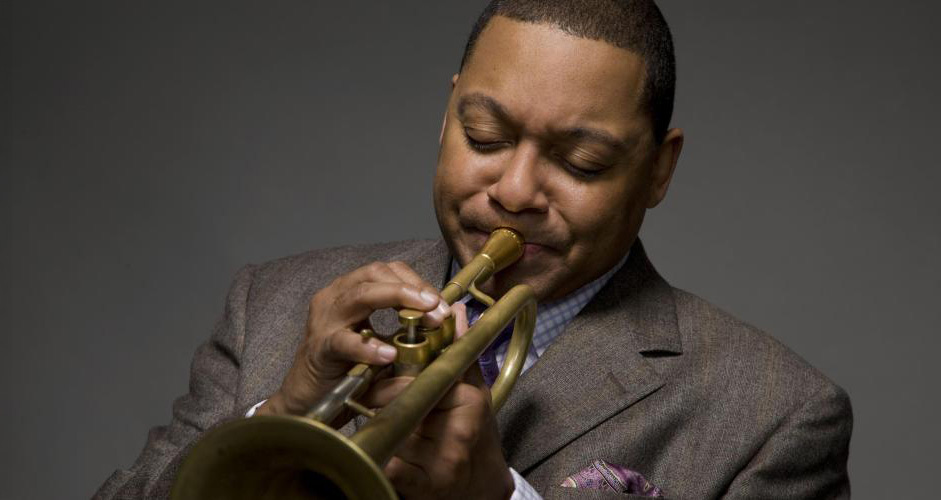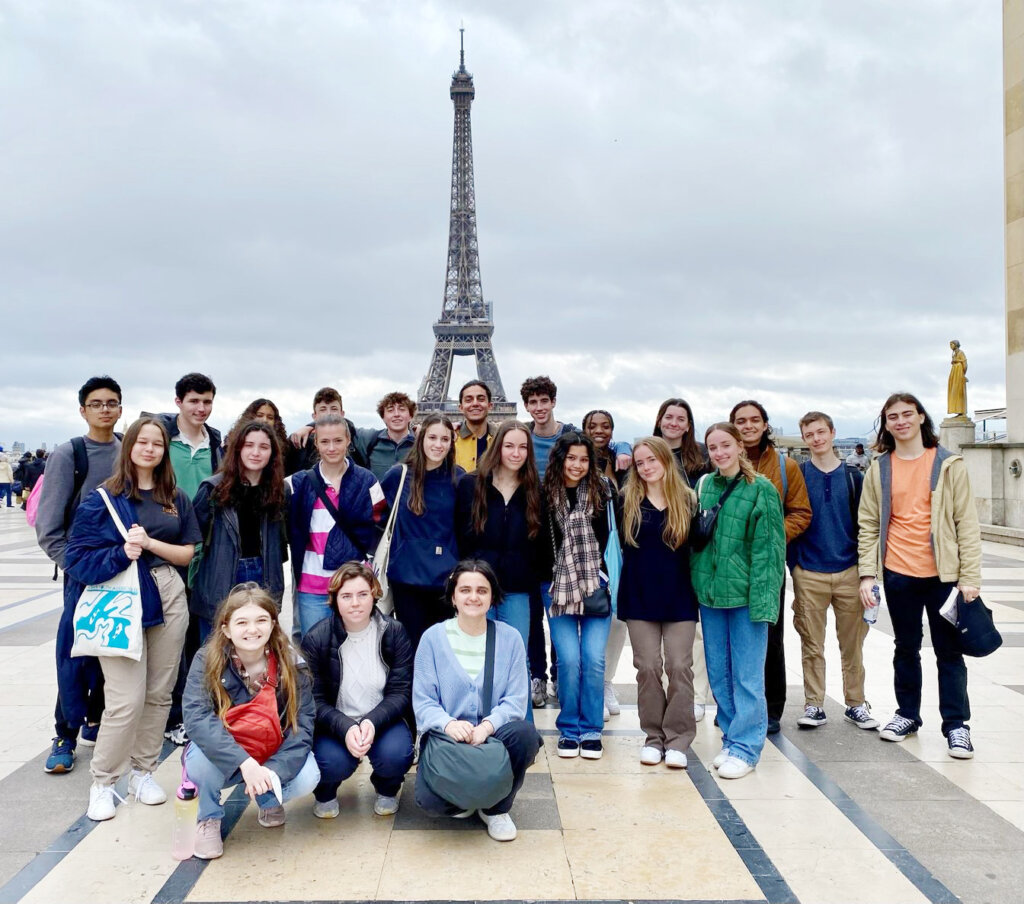Parents’ Association Resident Scholar
In a program that spans more than 30 years, the Parents’ Association sponsors Resident Scholars from a wide range of academic and professional disciplines to engage with Upper School students in meaningful ways. Scholars present at assemblies, run workshops, facilitate discussions. and more.
2024–25 Resident Scholar: Wynton Marsalis
Wynton Marsalis is a world-renowned trumpeter, bandleader, composer, and a leading advocate of American culture. He currently serves as Managing and Artistic Director of Jazz at Lincoln Center, the Director of Jazz Studies at The Juilliard School, and President of the Louis Armstrong Educational Foundation. Mr. Marsalis has lectured widely about meaning in American music, and has been a strong voice and advocate for the significance of jazz and improvisation in the development of the American aesthetic.

As the 2025 Park School Resident Scholar, Mr. Marsalis will be presenting to our entire Upper School student body in a special assembly on Wednesday, February 12, and will conduct small-session Master Classes for Upper School students. In addition, he is making time during his residency to connect with our 4th through 8th Grade students. Mr. Marsalis will also join us for an evening conversation on February 11 about music, America, and the power of art. This event will be open to the public. Thank you to the Park Parents’ Association for sponsoring the Resident Scholar program for more than 30 years.
Past Resident Scholars
2023-2024
Ty Seidule
Ty Seidule is Professor Emeritus of History at West Point where he taught for two decades. He served in the U.S. Army for 36 years, retiring as a brigadier general in 2020. He is a visiting professor at Hamilton College as well as a New America Fellow. In 2021, Secretary of Defense Lloyd Austin appointed Ty to the National Commission on Base Renaming. He served as the Vice Chair.
Ty has published numerous books, articles, and videos on military history including the award-winning West Point History of the Civil War. Ty graduated from Washington and Lee University and holds a Ph.D. from the Ohio State University.
2022-2023
Eric H. Holder Jr.
Eric H. Holder Jr. is a civil rights leader who is chairman of the National Democratic Redistricting Committee. He served as the eighty-second attorney general of the United States, the first African American to hold that office.
Mr. Holder is a Partner at the law firm of Covington & Burling LLP. He advises clients on complex investigations and litigation matters, including those that are international in scope and involve significant regulatory enforcement issues and substantial reputational concerns. Mr. Holder, who was a partner at Covington from 2001 to 2009, rejoined the firm after serving for six years as Attorney General.
2019-2020
Jal Mehta ’95
Jal Mehta ’95 is a professor at the Harvard Graduate School of Education (HGSE). His research explores the role of different forms of knowledge in tackling major social and political problems, particularly problems of human improvement. Mehta has also written extensively on what it would take to improve American education, with a particular focus on the professionalization of teaching. Mehta joined the HGSE faculty in 2008, and was named an emerging scholar by the American Educational Research Association in 2014. The author, co-author, or co-editor of four books, Mehta’s most recent, In Search of Deeper Learning: The Quest to Remake the American High School (Cambridge: Harvard University Press, 2019), seeks to identify where and how powerful learning is happening in schools today.
2018-2019
Dr. Leana Wen
Dr. Leana Wen is the Commissioner of Health for the City of Baltimore. An emergency physician and patient and community advocate, she leads the Baltimore City Health Department (BCHD). BCHD’s responsibilities include maternal and child health, youth wellness, school health, senior services, animal control, restaurant inspections, emergency preparedness, STI/HIV treatment, and acute and chronic disease prevention. Two weeks prior to her assembly at Park, Dr. Wen was named the next president of Planned Parenthood.
2016–2017
Dr. Cathy O’Neil
Dr. O’Neil is the author of the New York Times bestselling Weapons of Math Destruction: How Big Data Increases Inequality and Threatens Democracy. She made the switch from academia (professor at Barnard College) to the private sector, working as a quantitative analyst for the hedge fund D.E. Shaw, and then for RiskMetrics. She left finance in 2011 and started working as a data scientist in the New York start-up scene, building models that predicted people’s purchases and clicks. Dr. O’Neil wrote Doing Data Science in 2013, and launched the Lede Program in Data Journalism at Columbia University in 2014.
2014–2015
Matthew B. Crawford
Matthew B. Crawford is an American writer and research fellow at the Institute for Advanced Studies in Culture at the University of Virginia. The author of Shop Class as Soulcraft, the New York Times Bestseller, Matthew is now a contributing editor at The New Atlantis – A Journal of Science and Technology. He is also a motorcycle mechanic.
2013–2014
Cathy A. Small
Cathy A. Small, Ph.D., Professor in the Department of Anthropology at Northern Arizona University, spoke about the often unconscious ways that culture shapes us and the breakthroughs in insight and perception that can happen in recognizing cultural assumptions.
2012–2013 — Centennial Scholar
Dr. David Perkins
Dr. Perkins, Senior Professor of Education at the Harvard Graduate School of Education, is a “teacher of teachers” and is widely known for his work as co-founder of Project Zero. Perkins devoted one day of his three-day residency to each of the divisions — Lower, Middle, and Upper School.
2011–2012
Manil Suri
Professor of mathematics at UMBC and author (The Death of Vishnu — a novel long-listed for the 2001 Booker Prize and short-listed for the 2002 PEN/Faulkner Award — about social and religious tensions in India, The Age of Shiva, and “The Seven Circles.”
2010–2011
Malcolm Daniel ’74
Curator in Charge, Department of Photographs at the Metropolitan Museum of Art.
2009–2010
Madison Smartt Bell
Award-winning novelist, biographer, essayist, songwriter, and professor of English at Goucher College. He has written extensively, both fact and fiction, about the history of Haiti.
2007–2008
Dr. Ruth Faden
The Philip Franklin Wagley Professor of Biomedical Ethics and Executive Director of Johns Hopkins Berman Institute of Bioethics and Senior Research Scholar at the Kennedy Institute of Ethics, Georgetown University. Dr. Faden is the author and editor of numerous books and articles on biomedical ethics and health policy. Research interests include bioethics and public policy; ethics and cellular engineering; ethics and neuroscience; ethics and bioterrorism; ethics, genetics and public policy; and research ethics; and justice.
2006–2007
Dr. Mario Livio
Adjunct professor in the Department of Physics and Astronomy of the Johns Hopkins University and an astronomer at the Hubble Space Telescope Science Institute. His research interests include theoretical astrophysics, accretion into black holes, neutron stars and white dwarfs, supernova explosions, binary star evolution, and planetary nebula.
2005–2006
Josiah Bunting III
Author of The Lionheads, Ulysses S. Grant, an Education for Our Time, and All Loves Excelling, Vietnam veteran, scholar and Oxford graduate, who was president of Briarcliff and Hampden-Sydney colleges, superintendent of the Virginia Military Institute, and is now president of the Harry Frank Guggenheim Foundation.
2004–2005
Leon Fleisher
Pianist, conductor, and Andrew W. Mellon Chair in Piano at the Peabody Institute.
2003–2004
Taylor Branch
Pulitzer prize winning author of Parting the Waters (America’s Civil Rights Movement: Lasting Accomplishments and Unfinished Business).
2002–2003
Lucille Clifton
Former Poet Laureate of Maryland, Chancellor of the Academy of American Poets, Distinguished Professor at St. Mary’s College of Maryland.
2001–2002
Susan Hadary
Documentary Filmmaker and Academy Award Winner in the Category of Documentary Short Subjects for King Gimp. Presentation: “The Voice of Documentary.”
2000–2001
Dr. Eva T. H. Brann
Tutor-St. John’s College, Annapolis, MD. Presentation: Ursala Le Guin’s story “The Ones Who Walk Away from Omelas.”
1999–2000
The Honorable Antonin Scalia
Associate Justice, Supreme Court of the United States. Presentation: “On Interpreting the Constitution.”
1998–1999
Clyde Butcher
Distinguished nature photographer and teacher.
1997–1998
Dr. Robert Gallo
Professor and Director, Institute of Human Virology, University of Maryland.
1996–1997
Dr. Bill Puka
Professor of Philosophy, Rensselaer Polytechnic Institute.
1995–1996
Dr. Leon Botstein
President of Bard College. Presentation: “The Future of the American High School.”
1994–1995
Dr. Bert Vogelstein
Professor of Oncology, Johns Hopkins University School of Medicine. Presentation: “Nature, Knowledge, and Neoplasia.”
1993–1994
Dr. Richard Rubenstein
Professor of Conflict Resolution and Public Affairs, George Mason University, Fairfax, VA. Presentation: “Conflict and Change in the Middle East: A Conflict Resolution Perspective.”
1992–1993
Resident Scholars Symposium
“Reconstructing the Curriculum” Dr. Sara Coulter, Professor of English, Coordinator of Curriculum Integration, Towson State University Dr. Paul Lauter, Professor of Literature, Trinity College, General Editor. Dr. Rhonda Williams, Assistant Professor, Economics, Afro-American Studies, University of Maryland, College Park.
1991–1992
Dr. Michael M. Shara
Deputy Chief, Science Computing and Research Support, Hubble Space Telescope Science Institute. Presentation: “Frontier Problems in Astronomy.”
1990–1991
Dr. Arnold S. Relman
Physician, educator, and editor of the New England Journal of Medicine. Presentation: “Medical Professional Ethics in a Commercialized Society.”
1989–1990
Daniel Zwerdling
National Public Radio correspondent. Presentation: “The Secrets, Sins, and Successes of the American Media: An Insider’s Perspective.”
1988–1989
Maestro David Zinman
Music Director, The Baltimore Symphony Orchestra. Presentation: “The Art of Listening.”
1987–1988
Dr. Elizabeth Minnich
Professor of Philosophy, Union of Experimenting Colleges and Universities. Presentation: “Being Good and Acting Well: A Philosopher Looks at the Conflicts Between Private Morality and Public Effectiveness.”
1986–1987
Dr. Alan Walker
Professor of Cell Biology and Anatomy, Johns Hopkins University School of Medicine. Discipline: Anthropology. Presentation: “New Discoveries Related to Human Evolution.”
1985–1986
Dr. Nancy Weiss, ’61
Professor of History, Princeton University Presentation: “Turning Lincoln’s Picture to the Wall: The Shift of Blacks to the Democratic Party 1928-1940.”
1984–1985
Donald Ross
Consultant dedicated to causes of environmental matters, civil liberties, and consumer protection. Presentation: “Do You Count?: The Effect of Grassroots Participation on the Socio-Political Outcome.”
1983–1984
Dr. Penelope Eckert
Assistant Professor, Department of Anthropology, University of Michigan. Presentation: “Adolescent Social Categories: The Development of Workers and Managers in a Suburban High School.”
1982–1983
Michael Tilson Thomas
Conductor, lecturer, recording artist.
1981–1982
Professor Ian McHarg
Chairman, Department of Landscape Architecture and Regional Planning, University of Pennsylvania. Author of Design with Nature. Presentation: “Human Ecological Planning.”
1979–1980
Dr. Lawrence Wylie
C. Douglas Dillon Professor of the Civilization of France, Harvard University. Presentation: “What is Body Language? A Discussion of Cultural Problems in Non-Verbal Communication.”
1978–1979
Zelda Fichandler
Producing Director of Arena Stage in Washington, D.C. Presentation: “The Stage-A Special Place.”





